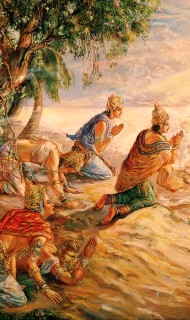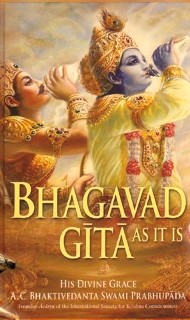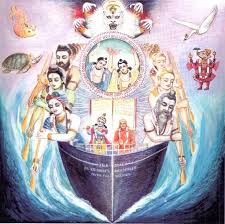 by Jai Sita Rani Devi Dasi Nagar Sankirtan in Chinatown
by Jai Sita Rani Devi Dasi Nagar Sankirtan in Chinatown SJMKL – Nagar Sankirtan in Chinatown
SJMKL – Nagar Sankirtan in Chinatown
→ ISKCON Malaysia Photos
Śāstra on Changing Dīkṣā
→ The Enquirer
In response to: On Changing My Dīkṣā
In Bhakti Sandarbha Jīva Goswāmī explains that there are circumstances in which a guru-disciple relationship can be dissolved. He quotes Nārada Pañcarātra: “He who gives irrational guidance, and he who follows that guidance, both attain a horrible destination.”
He also refers to Mahābhārata: “We should even reject a guru who proudly cannot explain the difference between right and wrong, or embarks on the wrong path.”
He also refers to Nārada Pañcaratra, “The guidance and mantras of a non-Vaiṣṇava lead one to hell. One should reject these and accept them from a Vaiṣṇava.”
In Jaiva Dharma Śrī Bhaktivinode explains that these references delineate two different reasons for changing one’s guru. “Though a dīkṣā guru shouldn’t be rejected,” he says, “still there are two causes where rejection is acceptable.”
One cause is when the guru literally opposes very basic Vaiṣṇava philosophies. This is illustrated by the later Nārada Pañcarātra quote, “The guidance and mantras of a non-vaiṣṇava lead one to hell. One should reject these and accept them from a vaiṣṇava.”
The other cause, however, is less drastic and is illustrated by the former Nārada Pañcarātra quote “He who gives irrational guidance, and he who follows that guidance, both attain a horrible destination.” Bhaktivindode explains, “The disciple may have prematurely accepted the guru without having carefully examined him. Later he will realize that his endeavors are not bearing their expected fruits, so he may reject that guru.”
The Mahābhārata quote makes reference to both reasons: “We should reject even a guru who is proud, cannot explain the difference between right and wrong, or embarks on the wrong path.” The two reasons are (1) improper behavior – “embarking on the wrong path” and (2) improper guidance – “cannot explain the difference between right and wrong.” And this is compounded by “pride” which means the guru doesn’t respond to attempts at correction.
Hari Bhakti Vilāsa also explains that a guru can be rejected under some circumstances. If the guru is found to be or become unqualified, for example. Many qualifications of a guru are given, but the key to all of them is being thoroughly conversant in all śāstra and being able to answer all questions in reference to these śāstra. If a guru falls short in this department, the disciple has legitimate grounds to consider that he does not in fact have a guru, and therefore may seek another guru.
Now I will explain my personal situation:
Neither ISKCON not my guru in it exactly fits into either cateogry entirely, and thus I have not “rejected” them. “Rejection” indicates forsaking something without need for permission or agreement from that party. That is not what I have done. I have dissolved my relationship with ISKCON and my guru in it under mutual consent. Thus I describe it as a “transferral” of dīkṣā, and use the term “dissolve” rather than “reject.”
With mutual consent, the above conditions need not be explicitly met.
I do not feel that ISKCON is “avaiṣṇava” or “against śāstric conclusions” – but I do feel that it is not strong enough in either of these departments for me. I found there was, for me, too much avaiṣṇava behavior in ISKCON as a whole. To mention only a few things, this ranged from child abuse to sexism, coupled with exploitation and pride, (us/them, and better-than-then-ism) leading to anger and divisiveness. And I found, for me, insufficiently broad and mature comprehension of śāstra (I even felt there was unwillingness to change that if it meant challenging their existing conceptions of what is “Vedic” and “bona-fide.”).
As a result I came to feel that I was not truly a disciple, and did not truly have a guru after all.
I explained myself to the parties involved over many months (if not years), and finally we agreed to this course of action. The relationship dissolved. Then with my former guru-disciple relationship dissolved, I sought the shelter of a person I myself can easily see has inspirationally vast comprehension of śāstra, holds śāstra above all else as the prime authority, has exemplary character in both major details and fine, day-to-day behavior. This person more fully inspires me to put in the significant effort it will take for me to one day become a Vaiṣṇava, and more effectively removes my confusions and misconceptions.
Therefore I absolutely do not agree at all with any claim that what I have done is not supported by śāstra.
My ISKCON guru, in fact, should be praised for exemplary behavior in agreeing to this – at is was clearly the best thing for my spiritual development, and a true devotee puts the wellbeing of others ahead of all other considerations.
Vraja Kishor das
Tagged: diksha guru, Guru, guru-disciple, guru-disciple relationship
ISKCON 50 Meditations: September 26, 2016
→ ISKCON News
Elusive Krsna
→ KKSBlog
(Kadamba Kanana Swami, 18 September 2016, Midrand, South Africa, Sunday Feast Lecture, Bhagavad-gita 9.9)
brahmāṇḍa bhramite kona bhāgyavān jīva
guru-kṛṣṇa-prasāde pāya bhakti-latā-bīja (CC Madhya 19.151)
Life after life, we are travelling through this material universe. Sometimes we reside in higher planetary systems and sometimes we reside here, in the middle planetary systems. Krsna is said to be neutral. This is very interesting because elsewhere in the Gita it says, mayadhyaksena prakrtih suyate sa-caracaram hetunanena kaunteya jagad viparivartate (Bhagavad-gita 9.10), that everything in this universe is going on under Krsna’s control. This is a fact because we are dealing with the energies of Krsna but Krsna is also neutral. Why is it so? Because all Krsna’s desires are directed to spirit and not to matter. Therefore, Krsna’s desires are aimed at the spiritual world, are aimed at the living beings who are also spirit. Krsna has no desire for this material world. In fact, the material world was the desire of the living being who wanted to be independent from Krsna then Krsna provided.
Srinivasa Acarya describes kṛṣṇot-kīrtana-gāna-nartana-parau premāmṛtāmbho-nidhī (Prayers to the Six Goswamis). He says that the six goswamis are always engaged in Krsna utkirtan, not just Krsna kirtan. Krsna utkirtan means loud kirtan, loudly chanting the holy names of the Lord, loudly glorifying the Lord. Krsna utkirtan and gāna-nartana-parau, they are chanting and nartana, they are dancing also. Premāmṛtāmbho-nidhī, they are fully absorbed in the ocean of transcendental love. So this ocean of transcendental love exists between Krsna and his devotees. It exists between Krsna and the devotees in the spiritual world and it also exists between Krsna and the devotees in the material world. Loving exchange – as the devotee makes offerings to Krsna, Krsna also makes offerings to the devotee.
But offerings to Krsna cannot be cheap. One should not have a business mentality. In India, in Vrindavan, there are money changers. At the money changers, for one rupee, you can get a hundred one paisa coins. Now, in India, for a long time, one paisa coins are no longer in circulation. They do not use them anymore, no shop will take a one paisa coins but the money changers have all the one paisa coins. People buy one paisa coins and put them in donation boxes or they put them on the altar. Temples have all the one paisa coins and the only thing the temples can do is sell them to the money changers. What can I say!? So we had kilos and kilos and kilos of one paisa coins in Vrindavan. Anyway, it is going on and we pray, ‘Jaya jagadisha hare, ham ko ek lakh chaahe,’ for this one paisa, we want hundred thousand, one lakh of rupees! So that is business.
Krsna acts neutral in the material world. Krsna is not really neutral. In another sense, he not neutral at all. Krsna has a very strong desire that every living being returns to the spiritual world and that every living being returns to the eternal pastimes. BUT as long as the living beings remain preoccupied with their material activities, Krsna remains neutral. He is witnessing – anumanta. He is overseeing – upadrasta. Yes, some enjoyment will come and some frustration will come. He knows, he is tri-kala-jnana, he knows past, present and future. He knows there is more to come. He knows you already went through so much. But is it enough? Is it enough to come to the point where you say, “Krsna, I am yours”? Prahlad was young but he said, “Krsna, I am yours.” Bhismadev was old and Bhismadev said, “Krsna, I am yours.” But in all cases, Krsna did not immediately give up that neutrality which he reserves for the conditioned souls. Oh, no. He wanted to see genuine offerings, genuine devotion first.
Narada was only five years old when his mother died of a snake bite. Somehow or other, he had served some great guests at home – great saintly personalities, Bhaktivedantas, great devotees who were fully knowledgeable of the Vedic conclusions. With the permission of these sages, he had taken their remnants. Then the sages had given him instructions; they had told him how to meditate actually. After the sages left, Narada remained alone with his mother. Then early one morning, as his mother went out to milk the cow, she got bitten by a snake and died. Although the boy was shocked and obviously affected by the death of his mother because of the transcendental instruction of the sages, he remembered, “The Supreme Lord is my shelter.”
 Therefore, he went to the forest and sat down under a tree and meditated on the Supreme Lord. The Supreme Lord at first did not respond. Narada was meditating and meditating and meditating but there was no sign from the Lord. Did the Lord even exist? Was he really there? How could he know that it was not all imagination? All that meditation and yet no sign.
Therefore, he went to the forest and sat down under a tree and meditated on the Supreme Lord. The Supreme Lord at first did not respond. Narada was meditating and meditating and meditating but there was no sign from the Lord. Did the Lord even exist? Was he really there? How could he know that it was not all imagination? All that meditation and yet no sign.
Then, suddenly, the boy saw the Lord very clear in the eye of the mind. It was so clear as if he was really there. Next moment, he opened his eyes and he saw that the Lord was there. Then the Lord disappeared. That was too much for a five-year-old, “How can you disappear? I have done all this and now you were here and now you are disappearing.” He became angry. So then the Lord returned and the Lord said, “You have meditated but you are not yet completely qualified, not yet completely pure. Therefore, in this life, you will not see me anymore but if you continue your practices, then at the end of your life, then you will again see me and you will attain a spiritual body…” So in this way, the Lord returned to neutrality. Again, even with his devotee, he was maintaining this neutrality which he normally reserves for the materialist. Why so? To test us… Are we really serious? We are chanting but we you really want it? Or is it just rock n roll? Are we ready to give our life? One paisa is not enough. Krsna is not that cheap!
Kitchri For 1000 People Yesterday In Salem, Tamil Nadu :-)
This…
→ Dandavats

Kitchri For 1000 People Yesterday In Salem, Tamil Nadu :-)
This is our new bronze pot :-) It’s weight is 1090 kg and capacity is 1350 liters…price..almost 8 lakhs..
Nigeria, Nanda Gram Temple – Journalists Interview HH…
→ Dandavats

Nigeria, Nanda Gram Temple - Journalists Interview HH Kavicandra Swami.
Mahavrata Devi Dasi: Maharaja spoke on the need for Ni...
Conversation with Vraja-renu dasa about farm development in Russia
→ SivaramaSwami.com
Varnasrama series.
The post Conversation with Vraja-renu dasa about farm development in Russia appeared first on SivaramaSwami.com.
Morning kirtan in NVD
→ SivaramaSwami.com
The post Morning kirtan in NVD appeared first on SivaramaSwami.com.
Evening bhajan in NVD
→ SivaramaSwami.com
The post Evening bhajan in NVD appeared first on SivaramaSwami.com.
Philadelphia Ratha Yatra 2016 (Album with photos)
Srila…
→ Dandavats

Philadelphia Ratha Yatra 2016 (Album with photos)
Srila Prabhupada: By prasadam distribution you will do service to the Lord, and the public will be pleased upon you as well. Gradually increase the number of guests, and don’t deny anyone. Continue in this way. Whatever is there, distribute equally – it may not be very sumptuous, but no one should be denied an equal portion. Letter to Giriraja, April 12, 1972.
Find them here: https://goo.gl/mgZTa7
Mothers and Kids.It is an odd development of the modern world…
→ Dandavats

Mothers and Kids.
It is an odd development of the modern world that being excessively anxious about our children is considered a virtue. We consider ourselves good parents if we make life easy for them, reward them for the smallest achievement, and are anxious for their safety and well being at all times.
There is, however, a hidden message in all of this anxious attention and it’s not good. As a teacher and school principal for 20 years, I saw all kinds of kids and all kinds of parents. For those who had confidence in their child, their child did great. Those who worried, who expressed that worry regularly, who tried to ‘fix’ every challenge the child had – their children had a weak sense of self. The hidden message was clear – “My parents are worried because they think I am not competent, I’m not capable.”
Being a mother is not easy. But it’s not that hard either. It is said that if a child has a self-assured and guiding adult in their life, they will grow up to be self-assured and self-guiding adults. Mothering means being there, but also not being there. It is patience, it is trusting that the child will figure it out, and it is watching from a distance as they do so.
There are many aspects to good mothering, but this one is key. We have to give our children the skills and emotional strength to make it through life by letting them experience and learn through real life. And that means letting them experience their own struggles. If we smother them, if we overly fret and protect, then we extinguish the fire of trust and competence. It’s a fine line, but we need to have the maturity and wisdom to make the call.
This famous poem can also inspire us be the balanced and stable parents our children need us to be:
Your children are not your children.
They are the sons and daughters of Life’s longing for itself.
They come through you but not from you,
And though they are with you yet they belong not to you.
You may give them your love but not your thoughts,
For they have their own thoughts.
You may house their bodies but not their souls,
For their souls dwell in the house of tomorrow,
which you cannot visit, not even in your dreams.
You may strive to be like them,
but seek not to make them like you.
For life goes not backward nor tarries with yesterday.
You are the bows from which your children
as living arrows are sent forth.
The archer sees the mark upon the path of the infinite,
and He bends you with His might
that His arrows may go swift and far.
Let your bending in the archer’s hand be for gladness;
For even as He loves the arrow that flies,
so He loves also the bow that is stable.
– On Children by Kahlil Gibran
Causeless mercy of Krishna
→ Dandavats
 By Girish Sarin
By Girish Sarin Each single verse of Srimad-Bhagavatam tastes like transcendental condensed milk of a Surabhi cow mixed with kesar, simply delicious and a nectar most satisfying to even conditioned souls (although it is meant to be tasted by paramhansas – liberated souls). No wonder that, along with Bhagavad-gita, Srimad-Bhagavatam is the specific scripture meant for kali-yuga. O my Lord, because You are endowed with causeless mercy, all opulences, all prowess and all glories, strength and transcendental qualities, You are the Supreme Personality of Godhead, the master of everyone. (SB 6.19.5) This verse, more specifically Srila Prabhupada’s purport, describes how kind is Krishna and how He bestows His causeless mercy on His devotees. Continue reading "Causeless mercy of Krishna
→ Dandavats"
Book Distribution ki.. Jaya!
Ghanashyam Govinda das: Michael had…
→ Dandavats

Book Distribution ki.. Jaya!
Ghanashyam Govinda das: Michael had received many books from our book distributors in the past. Fi...
Huge Sadhu-sanga mega-festival in Krasnodar region, Tuapse…
→ Dandavats

Huge Sadhu-sanga mega-festival in Krasnodar region, Tuapse district, Dzhubga, Russia (Album with photos)
Srila Prabhupada: Hearing the vibration of Hare Krishna automatically reminds one of Krishna’s pastimes. Both of them arise simultaneously in the mind when one is sincerely chanting. You cannot make any distinction between listening to the sound and thinking of the pastimes. But the process is to hear, and then Krishna’s pastimes, form, qualities, etc. will automatically come to mind. That is very nice. Letter to Satsvarupa, April 10, 1969.
Find them here: https://goo.gl/yEvNfU
Selected quotes from Caitanya Bhagavata
→ Dandavats
 By Niranjana Swami
By Niranjana Swami What to speak of being envious of the Vaisnavas, if one causes pain to ordinary living entities he is considered a fallen low-class person. Even after worshiping Lord Visnu, if a person gives trouble to other living entities, his worship becomes fruitless. Such a person suffers unlimited miseries. If a person is knowingly or unknowingly envious of a Vaisnava who is engaged in the nonduplicitous service of Lord Hari, his degradation is inevitable. Of this there is no doubt. Apart from this, if even persons claiming to be devotees of Visnu are envious of ordinary living entities and give various troubles to them, they are actually far away from devotional service to Visnu and are not fit to be called human beings. Their worship of Visnu becomes the source of misery. Those endowed with an absense of jive-daya, or compassion for other living entities, and yet proudly consider themselves servants of Lord Visnu achieve the threefold miseries rather than the devotional service of the Lord. Continue reading "Selected quotes from Caitanya Bhagavata
→ Dandavats"
The Passing of Gopana Daksa devi dasi
Niranjana Swami: This…
→ Dandavats

The Passing of Gopana Daksa devi dasi
Niranjana Swami: This morning (Wed, 2016-09-14) I received news that one of my early disciples, formerly from Ukraine, Gopana Daksa devi dasi, left this world in Vrndavana at 15:15, yesterday, September 13, 2016. She was a very serious and sincere disciple, who always displayed great determination in her spiritual life since the day I first met her in the early 1990’s. She relocated to Vrndavana many years ago, and for years, every year she would send me the results of her book distribution efforts. She had great faith in the holy name and in distributing Srila Prabhupada’s books.
In April of this year, when I was first informed about Gopana Daksa devi dasi’s declining health, she sent the following message to me through another devotee in Vrndavana:
“When she gets easier, she thinks that she should go on sankirtana, but for her it became difficult to do because it takes a lot of energy and efforts. Therefore Gopana daksha mataji is asking your permission to suspend sankirtana service for the while. Also she asks your blessings for a quick recovery. Please accept her humble obeisances.”
Despite the fact that her hemoglobin count was seriously low, that she had already had several blood transfusions, that she had to spend so much time in the hospital, and that the possibility of having leukemia was lurking in the background while waiting for test results, Gopana Daksha was still asking permission if she could temporarily suspend book distribution. She was that much determined.
For her sincere efforts in devotional service, Krsna blessed her with the opportunity to leave her body in Vrndavana, in full consciousness, calling out Krsna’s name with her final breath. We pray for her smooth journey back home, to the lotus feet of Sri Sri Radha Syamasundara.
Hare Krsna
Maharashtra Chief Minister congratulates ISKCON on 50th anniversary
→ Dandavats
 By Romapada Das
By Romapada Das The Chief Minister of Maharashtra in a message sent on 16th September, praised ISKCON for its '50 years of glorious achievements and service to humanity'. He praised ISKCON for the dissemination of what he called the 'glorious Vedic wisdom including the Bhagavad-gita and Srimad Bhagavatam'. The Chief Minister also praised ISKCON's philanthropic activities and youth preaching programmes. He concluded his statement by saying: "It is commendable that ISKCON is working with a view to spreading divine Vedic knowledge among the youth.I congratulate ISKCON for taking these social welfare activities, and hope that society will hopefully implement these activities in future also." Devendra Fadnavis is the 18th and current Chief Minister of Maharashtra, the state whose capital Mumbai is the commercial capital of India. A member of the Bharatiya Janata Party and the Rashtriya Swayam Sevak Sangh, Fadnavis became the second youngest Chief Minister of Maharashtra at 44. Continue reading "Maharashtra Chief Minister congratulates ISKCON on 50th anniversary
→ Dandavats"
ISKCON 50 Meditations: September 25, 2016
→ ISKCON News
Srila Prabhupada’s arrival on the Jaladuta
→ Ramai Swami
Recently, it was the anniversary of Srila Prabhupada’s arrival into Boston on the ship Jaladuta.
In 1922, when Srila Prabhupada first met his future guru, Srila Bhaktisiddhanta Sarasvati Thakur, he was requested to spread the message of Sri Caitanya to the English speaking countries of the world.
Finally, by arriving in the USA, Srila Prabhupada was fulfilling that profound instruction of his Guru Maharaja.
On Changing My Dīkṣā
→ The Enquirer
Foremost, I want to make it clear that I am not “against” ISKCON. I do not believe that ISKCON is “bogus.” Nor do I feel that its leaders are without significant merit. Nor do I think that its members cannot attain Krishna-prema. Most certainly, I don’t at all believe that ISKCON’s founder, A.C. Bhaktivedānta Swāmī Prabhupāda, is any less than a unparalleled empowered exponent of Śrī Krishna Caitanya Mahāprabhu.
I am sincerely grateful for the role Śrīla Prabhupāda, ISKCON, and its leaders and members have played in my life. There are, in fact, a considerable number of people in ISKCON whom I continue to hold in the highest regard. Foremost among them in particular is the 24-hour Kīrtan Sevaka, Aindra dāsa.
However, since the very beginning of my involvement with ISKCON, I have found myself either rationalizing, defending, dreading, or trying in vain to correct several ISKCON issues — from blatant and severe sexism, child abuse, censorship, and irrationality (justified by immature and incomplete ideas of “Vedic culture”) to stubborn misconceptions of the sambandha, abhideya, and prayojana of Gauḍīya Vedānta.
For my first 9 years, I dedicated myself mainly to rationalization and defense of these flaws. In the next 9 years I mostly turned away in dread of it all. In the third 9 years I tried (mostly in vain) to correct and improve things in whatever capacity I could. Over much of these last 9 years the guidance from my ISKCON guru gradually faded and was replaced by increasingly satisfying guidance from a source that I found to be more traditional yet more open, inclusive, and vastly more intellectual and śāstric: Satyanārāyan dāsa Bābājī of the JIVA Institute in Vṛndāvana.
It feels natural and organic now to transfer my dīkṣā to this source, with the permission of my ISKCON guru.
I hope that my friends and associates in ISKCON will not be unduly distanced or threatened by this. Again, I have nothing against ISKCON and wish nothing but the best for it and for its individual members. I look forward to participating in the brighter side of ISKCON whenever it would still welcome, tolerate, or even just overlook my presence.
Vraja Kishor
The team of the Temple of Vedic Planetarium is touring Cape…
→ Dandavats

The team of the Temple of Vedic Planetarium is touring Cape Town, South Africa for the purpose of achieving support for the completion of the construction work. All glories to Srila Prabhupada!
Srila Prabhupada: The Hare Krishna mantra says, “My dear Lord Krishna, my dear Lord Rama, O energy of the Lord, Hare, kindly engage me in your service.” (Srimad-Bhagavatam, 4.24.69 Purport)
Why are some people born wealthy and some born poor?
→ The Spiritual Scientist
Answer Podcast
Download by “right-click and save content”
The post Why are some people born wealthy and some born poor? appeared first on The Spiritual Scientist.
Does destiny determine who comes to spirituality and who doesn’t?
→ The Spiritual Scientist
Answer Podcast
Download by “right-click and save content”
The post Does destiny determine who comes to spirituality and who doesn’t? appeared first on The Spiritual Scientist.
How can we overcome envy?
→ The Spiritual Scientist
Answer Podcast
Download by “right-click and save content”
The post How can we overcome envy? appeared first on The Spiritual Scientist.
Why do we become more angry with our family members than with our colleagues?
→ The Spiritual Scientist
Answer Podcast
Download by “right-click and save content”
The post Why do we become more angry with our family members than with our colleagues? appeared first on The Spiritual Scientist.
What does the Gita 4.11 – everyone is on my path – mean?
→ The Spiritual Scientist
Answer Podcast
Download by “right-click and save content”
The post What does the Gita 4.11 – everyone is on my path – mean? appeared first on The Spiritual Scientist.
How can we be both detached and compassionate?
→ The Spiritual Scientist
Answer Podcast
Download by “right-click and save content”
The post How can we be both detached and compassionate? appeared first on The Spiritual Scientist.
Why do people become sarcastic towards those practicing bhakti?
→ The Spiritual Scientist
Answer Podcast
Download by “right-click and save content”
The post Why do people become sarcastic towards those practicing bhakti? appeared first on The Spiritual Scientist.
How to avoid becoming disheartened on seeing our lack of spiritual emotion while chanting?
→ The Spiritual Scientist
Answer Podcast
Download by “right-click and save content”
The post How to avoid becoming disheartened on seeing our lack of spiritual emotion while chanting? appeared first on The Spiritual Scientist.
How can we avoid becoming fearful about future possibilities?
→ The Spiritual Scientist
Answer Podcast
Download by “right-click and save content”
The post How can we avoid becoming fearful about future possibilities? appeared first on The Spiritual Scientist.
Prayers…Sutapa das: One of my fellow monks is an…
→ Dandavats

Prayers…
Sutapa das: One of my fellow monks is an extremely prayerful person. He has regular stories of the reciprocation and interaction that comes from conversing with God. Though inspired, I personally find it difficult to pray. It usually feels unnatural and artificial; probably a combination of my impersonal character, hard-heartedness, lack of faith, and general life philosophy of “work hard and be practical.” Someone, however, recently offered me an interesting antidote – “pray for other people” they said. Whether a friend, family member, work colleague, or even a stranger you meet for the first time, just stop for a few moments and sincerely pray for something that will help them in their life. I began to try. Unconventional as it sounded, I could immediately appreciate the power of this approach on many levels:
Personal level – Rather than being critical, judgmental or aloof, we evolve into selfless agents of positive change. Since prayer invokes divine intervention, we are not simply observers of the world, but can make a difference, even to people we have very little physical contact with. In such moments of noble prayer, we rise beyond self-absorption and forget our own difficulties.
Relationship level – Taking the time to deeply contemplate someone’s life transforms our relationship with them. We learn to see beyond the external chaos, appreciating that everyone is a pure soul trying to break free from material entanglement. Prayer helps one to connect with people on a deeper level.
Social level – When a group of people form, each one sincerely wanting the others to excel, it creates a unique spiritual energy. That unity, fellowship and genuine warmth helps them to achieve their goals and transform the world. Prayer brings people together.
It reminded me of how Swami Prabhupada would sign off his correspondence with “your ever well-wisher.” His prayer was completely selfless; a natural consequence of his incredible compassion and concern for all. Saintly persons are said to feel another’s pain as their own (para dukha dukhi). Just as we spontaneously attend to any ailment in our body, they are spontaneously impelled to relieve the suffering of the general populace. Even if we fall short of that pure stage, we can still institute the process of selfless prayer as a vehicle to developing deeper sensitivity, which is so integral to spiritual advancement. After all, we find ourselves by thinking of others. Try it out this week – take a few quality moments to sincerely pray for the wellbeing of someone else. And if you’re finding it difficult to identify someone, you could always slip in a good word for this struggling soul. :)
Titikshava Karunika Das – Hare Krishna Kirtans With A Rock Twist…
→ Dandavats

Titikshava Karunika Das - Hare Krishna Kirtans With A Rock Twist on NNN ( video - inteview)
NANO NEWS NETWORK -NNN MEDIA
I...
Health report
→ SivaramaSwami.com
The post Health report appeared first on SivaramaSwami.com.
In every city and village! (Album with photos)
Kavicandra Swami:…
→ Dandavats

In every city and village! (Album with photos)
Kavicandra Swami: I just finished a trip to and around West Africa.. First Lagos for a few festivals, then to Benin City. There, every day was harinam with many blissful children coming along. Then to Port Harcourt and after that Enugu.
Then back to Lagos for Krsna Janmastami and Srila Prabhupada’s appearance day.. I was lucky that Indian consulate gave me a quick one year multiple entry visa.
Then to Abidjan, Ivory Coast.. There the harinam is amazing since large crowds of local children dance and chant with us.. From there to Lome, Togo. Harinam there was also very blissful. Then to Accra, Ghana. That is our biggest community in the area so there is much happening there.. From there I went to Nkawkaw (COCO) and Kumasi, then back to Accra.
I wish more devotees would visit these countries. I posted a few pictures along the way. here are some better ones.
Find them here: https://goo.gl/Xcb1F8
Spiritual guarantee
→ KKSBlog
(Kadamba Kanana Swami, 20 March 2014, Melbourne, Australia, Srimad Bhagavatam 2.7.52)
We are not free to live life just as we want to: prakrteh kriyamanani, gunaih karmani sarvasah, the bewildered spirit soul, under the influence of the three modes of material nature, thinks himself to be the doer of activities which are in actuality carried out by nature, Bhagavad-gita 3.27.
Rather, there is a script and this script is going along even though we have so many desires. In the middle of all that, “I want this, I want that. I want to be here, I want to be there. I want to do all these things.” But ultimately, the script will determine what we are allowed to do and what we are not allowed to do, where success will be and where failure will be. With time, we begin to realize more and more that things are not in our control because with time, we see in so many situations that we wanted things and it did not happen. We are controlled by the material energy, simply by circumstances.
Sometimes, we are successful and we are surprised. It was something very difficult and it worked; everyone says, “Wow, you did that very expertly.”
But actually the truth is, it just happened, somehow or other, it just happened and was successful. Other times, you work so hard, you know you worked so hard and it was just not successful, “It is just not logical. I’ve done it a hundred times and it worked a hundred times. Now it’s just not working; why not?” So like this, we are in the material world, depending on the arrangement of Krsna and who is providing things to us through the material energy.
Spiritual life is different. In spiritual life, you can be sure. In material life, you are never sure. You never know, you cannot be sure about anything in material life but in spiritual life you can be sure, actually. The result is guaranteed; it is certain.
When you engage in devotional service, success will be there, etavaj janma-saphalyam (CC Adi 9.24), if you want to make this life successful, dehinam iha dehishu (CC Adi 9.24), while we are now in this body, then use it in the service of Krsna. Then surely, it will be successful. This is the injunction of scripture.
Pili Pokhar Pastime
→ Dandavats
 By Varsana Swami
By Varsana Swami Srimati lifted up Her skirt and stepped into the water and looked down to wash Her hands. And then, when She saw Her reflection in the water, She was overcome by its beauty. She was seized by this feeling “maybe I should be Gopal’s constant companion and never ever have to leave His side?” And then She began to wash her hands and the waters turned golden and the waves spread out in all directions, hitting the banks and rippling back – forming a beautiful pattern of evolving rasa. And as the waters turned – from Her hands – that golden luster begin expanding toward the far shores of the kund. Continue reading "Pili Pokhar Pastime
→ Dandavats"
Daily Darshan: September 24,2016
→ Mayapur.com
The post Daily Darshan: September 24,2016 appeared first on Mayapur.com.
Vrindavana das, ACBSP, left this world
→ Dandavats
Transform anxiety into intensity by spirituality
→ The Spiritual Scientist
Evening congregation program at Pittsburg, USA
Podcast
Download by “right-click and save content”
The post Transform anxiety into intensity by spirituality appeared first on The Spiritual Scientist.







